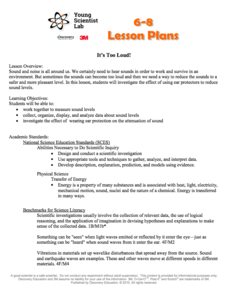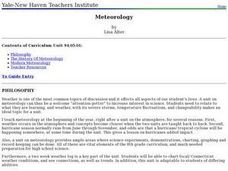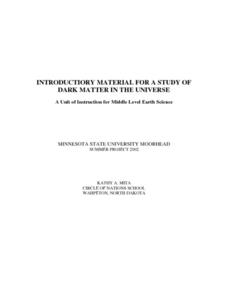Foundation for Water & Energy Education
How Can a Dam Affect a River? Activity B
Second in a pair of activities, young ecologists continue to examine the food pyramid of a freshwater ecosystem. They take a look at the food pyramid drawn in Activity A and consider what would happen if a reservoir was created on the...
Curated OER
Graphing Pendulum Results
Sixth graders set up a pendulum experiment deciding which variable to manipulate (length of string or weight on the string). They create a hypothesis, collect necessary equipment, and write out each step of their experiment. They then...
Curated OER
Scientists Write!
Students use a journal to record observations. They make notes about what research may be needed to answer questions that have come up in the field and sketch or make connections in the curriculum. They research bioinformatics and...
Discovery Education
It's Too Loud!
STEM scholars investigate sound attenuation by conducting an experiment in which they compare the farthest distance that they can hear a sound with and without ear protection.
Curated OER
Animal Coverings
Students compare and contrast the types of coverings found on animals. They identify a wide variety of animals in a museum room. They classify animals based on their coverings as well.
Foundation for Water & Energy Education
What is the Water Cycle? Activity A
Hydrologists create a concept map about how water is used and a sentence strip defining water and describing its unique properties. Small groups work together to fill a small milk carton and compute the mass of water inside. The next...
Curated OER
Where Do I Live?
Students gain a better understanding of the population of the region they live in by comparing U.S. census data on the internet.
Curated OER
Volcanoes in Space
Students research volcanoes on the Internet to compare/contrast the volcanoes on Earth to the ones found on Io, a moon of Jupiter. Students list the similarities and differences in science journals, and illustrate pictures of the volcanoes.
Curated OER
Lotto or Life: What Are the Chances?
Though the website does not seem to have the mentioned video, a reding and lottery style games simulate the chances of finding intelligent life somewhere other than Earth. Without the video, this lesson is short, but it can be a useful...
Curated OER
Meteorology
Students research and produce an oral history that reflects the importance of meterologists in the lives of people in their community.
Curated OER
Castaway or Survivor
What a clever idea! Chemistry learners imagine themselves deserted on an island with a radio, but no batteries. They also have a few odds and ends in their pockets and storage chest. They are challenged to create a battery that will...
Curated OER
Sink It
Introduce your class to the concept of sinking and floating. In groups, they classify objects after making predictions about which materials will sink or float. They record their results and create graphs and charts to share with the class.
Curated OER
Estimation Task
Upper graders practice their estimation skills by observing different objects then making their best guess without using measuring instruments. Learners are asked to estimate mass, length, volume, and area.
Curated OER
Cloud Observations using GLOBE Protocols
Students observe which of ten types of clouds are visible and how much of the sky is cloud covered. They see that by observing clouds, we can get information about temperature, moisture, and wind conditions in different places in the...
Curated OER
Alcohol and Pregnancy Don't Mix!
Seventh graders learn about John Kellerman, a youngster who was born with Fetal Alcohol Syndrome. They learn how alcohol and pregnancy doesn't mix.
Curated OER
Creating Impact Craters
Sixth graders simulate the creation of impact craters on Mars.Through the creation of model surfaces, the effects of an impacting object's mass, velocity and size are determined, and the features of the resulting crater are identified.
Curated OER
Interplanetary Travel Guide
In groups of six, middle school space scientists create an imaginative travel brochure for attracting visitors to the planet Mars. Information must include surface features and atmospheric conditions. Although time-consuming, this is a...
Curated OER
Zebrafish Development
Students examine the early development of zebrafish as a model for embryo development in humans. They observe various stages of zebrafish reproduction from sperm and eggs to fertilized eggs and hatchlings.
Curated OER
Module 1, Unit 2, Lesson Plan 2: PCR and DNA Diagnosis
Students discuss the importance of the Polymerase Chain Reaction for biologists. They explain what factors make the Polymerase Chain Reaction possible. Students explain the steps in thermocycling and what happens during each step.
Curated OER
Dark Matter In The Universe
Students investigate the concept of dark matter and how it occurs in the universe. They conduct research using a variety of resources. Students use the information by reading at least two articles about dark matter. They also generate...
Curated OER
Sheffield Island Adaptation Activity
You don't have to visit The Maritime Aquarium to use this plan, but you would need to find a location where a variety of bird species live, re-write the activity worksheet to incorporate the local species, and purchase field guides for...
Curated OER
Why Are The Shore Birds Dying?
Students engage in a field study of birds and how they are in danger harm due to environmental factors. They list different possible causes in a prediction activity. The observations are done while writing up data and connecting it to a...
Curated OER
Will It Sink Or Float?
Have your class predict whether objects will sink or float in water. Learners consider a data table of mass, volume and whether the object sank or floated. They develop an evidence-based explanation for the results.
Curated OER
Tide Pool Discovery
First graders visit the Discovery Pool, where they use their senses to investigate the different tide pool species. They touch different species. Students describe how each one feels, and what they look like in words. They draw the...
Other popular searches
- Scientific Inquiry Lesson
- Scientific Inquiry Skills
- Scientific Inquiry Method
- Scientific Inquiry Health
- Scientific Inquiry Model
- Scientific Inquiry Process
- Scientific Inquiry Lab
- Scientific Inquiry Music
- Scientific Inquiry Questions
- Scientific Inquiry + Health
- Scientific Inquiry Experiments
- Scientific Inquiry and Design























